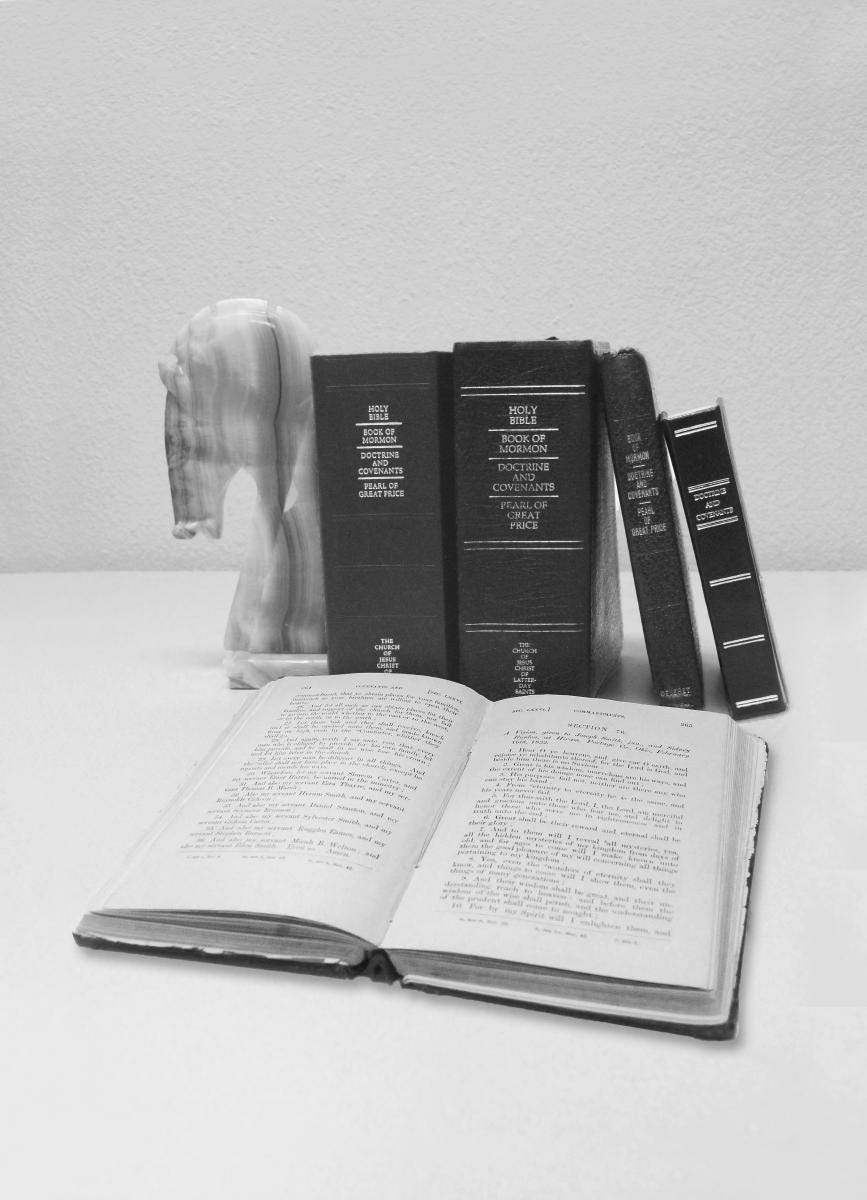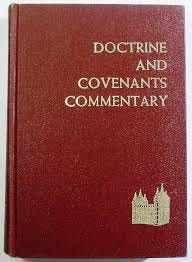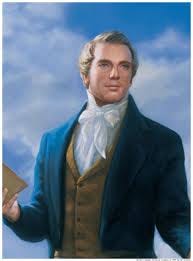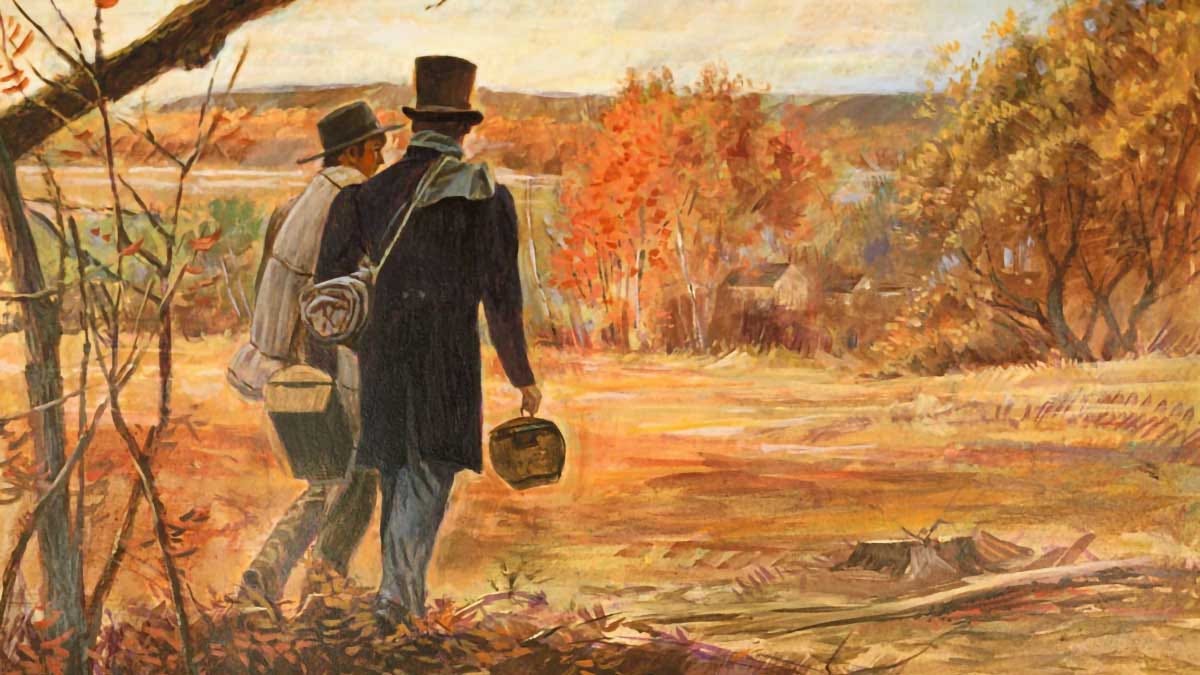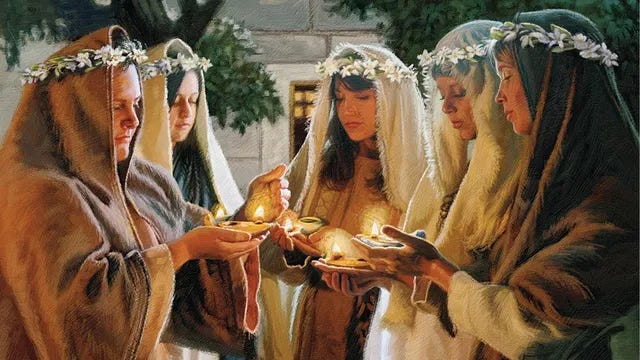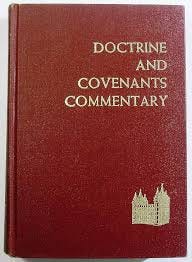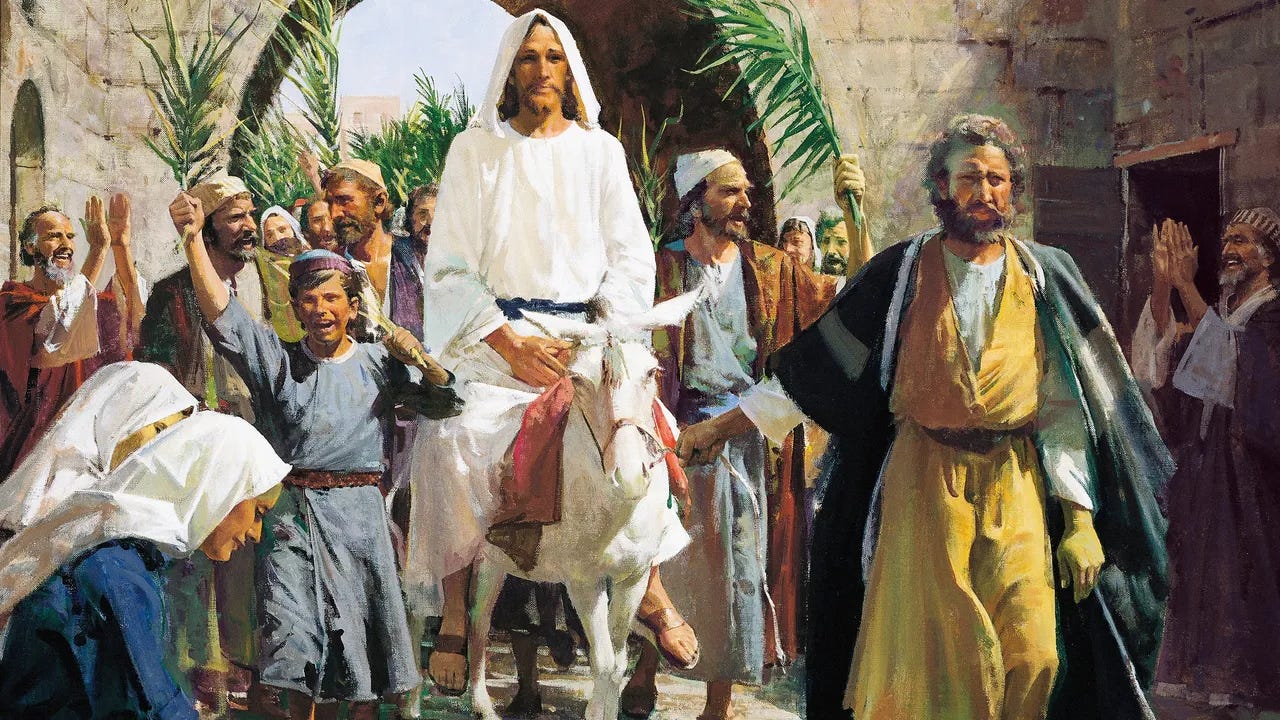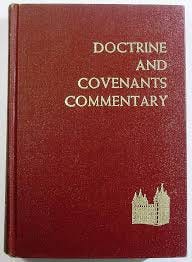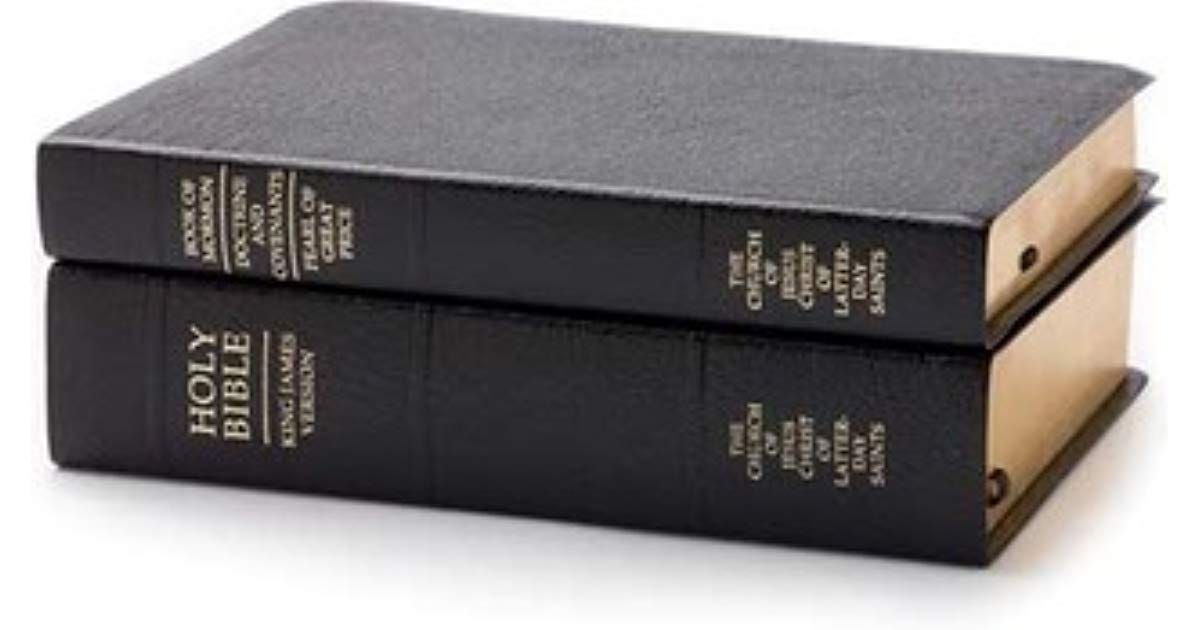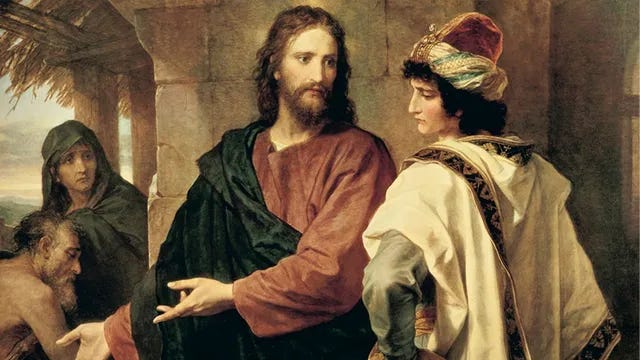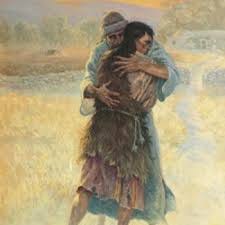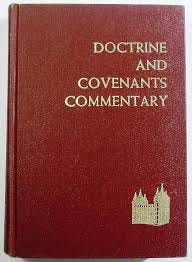In the previous post we learned about the historical background for Doctrine and Covenants 58. In this post we will study and comment upon the same section a piece at a time.
Hearken, O ye elders of my church, and give ear to my word, and learn of me what I will concerning you, and also concerning this land unto which I have sent you. (D&C 58:1)
In their commentary, Smith and Sjodahl provide a good outline for studying this section:
The Colesville Branch had just arrived; also Sidney Rigdon, Sidney Gilbert and wife, and Elders Isaac Morley and Ezra Booth. This Revelation concerning the Elders of the Church and the land of Zion was then received. In it the Lord (1) promises glory to the faithful, and warns the Elders of tribulation (2-5); (2) sets forth the reasons why they had been commanded to go to Missouri (6-14); (3) warns Edward Partridge (15-33); (4) gives further directions concerning the land and its settlement. (p. 333)
Just as the early elders of the Church hearkened, gave ear to the word of God, and learned of Him, so too may we. We may learn from the Lord His will concerning us and also concerning the promised land. (See also here)
For verily I say unto you, blessed is he that keepeth my commandments, whether in life or in death; and he that is faithful in tribulation, the reward of the same is greater in the kingdom of heaven.
Ye cannot behold with your natural eyes, for the present time, the design of your God concerning those things which shall come hereafter, and the glory which shall follow after much tribulation.
For after much tribulation come the blessings. Wherefore the day cometh that ye shall be crowned with much glory; the hour is not yet, but is nigh at hand.
Remember this, which I tell you before, that you may lay it to heart, and receive that which is to follow. (D&C 58:2-5)
It’s comforting and encouraging to know that those who endure tribulation will be crowned with glory, and especially that there is an even greater reward in the kingdom of Heaven for those who are faithful in tribulation. The Prophet Joseph Smith spoke this revelation like Lehi and Nephi of old who also promised that those who keep the commandments shall prosper in the land. In spite of many centuries of dwindling in unbelief, there is a kind of continuity for the Lamanites or the seed of Lehi that was established through the connection between the last Nephite prophet Moroni and the first prophet of this last dispensation, the Prophet Joseph Smith.
When Joseph Smith and his associates arrived in Missouri, they beheld things with their natural eyes, and were disappointed. They could not see what the Lord saw, although Joseph Smith was blessed with the gift of seership and prophetic vision. With his natural eyes, Joseph Smith may have felt disappointed because of the backward condition of the land and the people in Missouri, but with his spiritual eyes he could confidently declare: “I see it, and it will be so.”
God’s design for the Promised Land, for Zion and the New Jerusalem, continues. The tribulation of the early Saints was a prelude to glory. The Lord taught this as an eternal principle: after much tribulation come the blessings. The Lord foresaw the glory of the early Saints or the day in which they would be crowned with much glory, and the principle is the same for us today. The Lord revealed these things to help His Saints prepare for their blessings. By remembering and laying these things to heart, the Saints would be enabled to endure tribulation and receive the blessings that followed.
The beginning of this section is as prophetic as anything in scripture. During the next few years especially the Saints experienced severe tribulations, and these severe tribulations were followed by glorious blessings. Regarding these verses, Smith and Sjodahl observe:
Glory Promised After Tribulation.
In these paragraphs the Lord warns the Elders and Saints against expecting a life of ease, free from trials, in Zion. They were to receive blessings, but not until they had endured tribulation. They were to be crowned with glory, but only after severe trials. They did not comprehend this, and needed the warning given in this Revelation. Many of them had gone west to escape persecution, as did the Pilgrim Fathers in their day. Were they to encounter new outbursts of violence in their God-given home? We know now how the tribulation came, but when the prediction was first given, it must have been to most of the Saints almost a riddle.
Blessed is he that keepeth my commandments] Tribulations were to come, but those who were faithful and kept the commandments of God were “blessed” or happy, in life or death.
Note that one of the first predictions regarding Zion made it known to the Saints that they would meet tribulation there; and yet they gathered; so strong was their faith.
Ye cannot behold *** the design of your God] The Saints could not, at that time, comprehend that they were facing a most serious problem, involving the very existence of the Church. They were in a new, sparsely-settled country. Usually settlers are welcome in such places. They lived under a glad that waves as an emblem of liberty over a Republic proclaimed to be a place of refuge for the oppressed of all the world. Whence could any serious trial come? God knew; and also that glory would follow.
After much tribulation *** blessings] When the Saints were driven from Missouri, and then from Illinois, some of their enemies thought the end of the Church had come. But less than twenty years after the exodus, the Saints were prospering in their new home in the mountain valleys. Says Elder George A. Smith, in a sermon delivered at Salt Lake City, in 1865:
“Notwithstanding the many drawbacks and difficulties encountered, in the shape of drouth, crickets, grasshoppers, and the cold, sterile climate, the Spirit of the Lord was hovering over the great basin. *** I never was at the crossing of the Sevier River in summer for seven years after our settlement in Iron County had been established, without experiencing frost; and now in the season thereof *** To have told the mountaineers ten years ago that grain could be raised in the upper valleys of the Weber, where they encountered heavy frosts every month in the summer, would have incurred their ridicule; but the genial influence of the Spirit of the Almighty has softened the rigor of the climate, and the flourishing counties of Morgan and Summit are the result. I suppose that Provo Valley, this season, with all its losses, will raise not less than thirty thousand bushels of grain and vegetables. *** Go to Pottawatomie, Iowa; Nauvoo, Ill.; or Kirtland, Ohio, and ask for apples and peaches, and you will find them few and far between. In February, 1857, I visited my former field of labor in Western Virginia, and inquired of an old friend for fruit; his reply was, "‘My peach trees are all killed, and I have not been able to raise any peaches for six years *** ‘ It is so wherever the Saints have lived and been driven away - their glory has departed to return no more, until the land is dedicated and consecrated to God and occupied by the Saints” (Journal of Discourses, Vol. XI., pp. 177-8).
Blessings came to the Saints after the tribulation. They will yet be crowned with glory in Zion.
The hour is not yet, but is nigh at hand] It must be much nearer now than when this inspired line was first penned.
Remember this] The Lord desires His people to remember the prophecies given, in order that, when they see them fulfillled, they may have faith to obey His word. (pp. 334-335)
What do you learn about tribulation or challenges from the Lord’s words in Doctrine and Covenants 58:1–5?
Why do you think some blessings come only after tribulation?
What blessings have you received after tribulation?
Behold, verily I say unto you, for this cause I have sent you—that you might be obedient, and that your hearts might be prepared to bear testimony of the things which are to come;
And also that you might be honored in laying the foundation, and in bearing record of the land upon which the Zion of God shall stand;
And also that a feast of fat things might be prepared for the poor; yea, a feast of fat things, of wine on the lees well refined, that the earth may know that the mouths of the prophets shall not fail;
Yea, a supper of the house of the Lord, well prepared, unto which all nations shall be invited.
First, the rich and the learned, the wise and the noble;
And after that cometh the day of my power; then shall the poor, the lame, and the blind, and the deaf, come in unto the marriage of the Lamb, and partake of the supper of the Lord, prepared for the great day to come.
Behold, I, the Lord, have spoken it.
And that the testimony might go forth from Zion, yea, from the mouth of the city of the heritage of God—
Yea, for this cause I have sent you hither, and have selected my servant Edward Partridge, and have appointed unto him his mission in this land. (D&C 58:6-14)
The day of Jesus Christ’s power approaches. Our Lord elevated the vision of His early Saints, and He elevates our vision in these verses. He teaches us “the why” of these revelations and of the gathering of Israel. He teaches why He called missionaries, why He called the early Saints to lay the foundations of Zion, and why Zion shall be built up. The Lord also points forward to the great marriage of the Lamb, and the supper of the Lord. We learned something about this great future sacrament meeting in D&C 27, but the description of this glorious event in these verses in D&C 58 increases our excitement, augments our joy, and lifts our vision to understand the purpose of the Lord’s work in the last days.
If we will be obedient, prepare our hearts, and remember and honor those who laid the foundations for Zion, then we can look forward with joy to the great supper of the house of the Lord. What a feast it shall be! The poor especially shall be blessed, with a feast of the fat things, of wine on the lees well refined. The prophets shall be vindicated. The truths of which they have prophesied shall not fail, and the earth shall know it.
All nations shall be invited to the great supper of the house of the Lord in the order that the Lord has designated, beginning with the rich and the learned, the wise and the noble, and then, in the day of His power, the poor, lame, blind, and deaf shall come in unto the marriage of the Lamb, and partake of the supper of the Lord. For this reason the Lord called Edward Partridge to his mission in Missouri.
This is Smith’s and Sjodahl’s commentary on these verses:
2. Reasons Why the Saints and Elders Were in Zion
The Lord here gives six reasons for calling the Elders and Saints to go to the land of Zion.
That you may be obedient] This is the first reason. Obedience is absolutely necessary for the furtherance of the Kingdom of God. There must be one directing will. This is necessary in earthly concerns - a factory, a ship, a railroad system. It is equally necessary in the kingdom of God. His will must be supreme there.
To render obedience to lawful authority, is not humiliating or degrading. Even the Son learned obedience (Heb. 5:8), before He became the Author of eternal salvation. Disobedience, or rebellion, is as bad as idolatry (I. Sam. 15:23). The Lord does not stand personally in the midst of His people to direct their affairs but He speaks to them through His inspired servants. When we obey their counsel, we obey God. Those who refuse to obey them, would refuse to obey the Lord, even if He spoke to them Himself, in person.
That your hearts might be prepared to bear testimony] This is another reason. There were truths which the Lord would reveal only in Zion. Those who were there could testify of those truths, as witnesses. They could bear witness of that which they had heard.
Laying the foundation] This is the third reason. It was to be their privilege to lay the foundation. They might have expected to be given the honor of building the City and constructing the Temple, but the promise was that they would lay the foundation. This they did; they dedicated the land and the Temple site, and, we may say, prepare, to some extent, the people from whom the builders will come, for their future great mission.
Bearing record of the land] This is the fourth reason. They were to testify, not only of what they had heard but of what they had seen themselves, of the land.
That a feast *** for the poor] This is the fifth reason. One great purpose of God in establishing Zion is to save the world, through its laws and institutions, from the curse of poverty and destitution. The object is to give to the world an entirely new social order, to establish a community in which even the poor would share the “fat things” with “the rich and the learned, the wise and the noble” (v. 10). Zion is to be a place for the “supper of the house of the Lord” - a banquet hall - “unto which all nations shall be invited.” There “the marriage feast of the Lamb” will be held when the time has come for God Omnipotent to reign upon this Earth (Rev. 19:7-9). It is the New Jerusalem, consisting of the City of Zion and the “Jerusalem which is above,” that is, “the Bride of the Lamb” (Rev. 21:2; Gal. 4:26; Eph. 5:27). The two will be united when our Savior comes in His glory. “Blessed are they who are called unto the marriage supper of the Lamb.” Yea, blessed are they who will be called to become citizens in the City of Zion.
-
-
After that cometh the day of my power] Zion will be built. The Temple will be reared. Enoch’s Zion, the “Jerusalem which is above,” will meet the Saints who have part in the first resurrection, and those who will be changed in the twinkling of an eye, and they will all be united. Then will come the day of God’s power. The poor and the lame, the blind and the deaf will all be invited to partake of the blessings of the Millennium. The Earth will not be freed from all defects at once. The work of redemption will be gradual.
-
That the testimony might go forth from Zion] That is the sixth reason. The law must go forth from Zion, as the light from a lighthouse. (pp. 336-337)
I appreciate and agree with most of Smith’s and Sjodahl’s commentary. However, I believe that they are somewhat mistaken about the Lord not standing personally in the midst of His people. On at least five different occasions in the Doctrine and Covenants, the Lord declared: “I am in your midst.” I also think that Smith and Sjodahl rely too heavily upon what they call the “inspired servants” of the Lord. While it is true that the Lord has inspired servants, such as the Prophet Joseph Smith and others, and while it is true that it is wise to obey their counsel, it is also true that the Lord is in our midst and that He invites us to learn directly from Him and to obey Him directly.
The revelation continues:
But if he repent not of his sins, which are unbelief and blindness of heart, let him take heed lest he fall.
Behold his mission is given unto him, and it shall not be given again.
And whoso standeth in this mission is appointed to be a judge in Israel, like as it was in ancient days, to divide the lands of the heritage of God unto his children;
And to judge his people by the testimony of the just, and by the assistance of his counselors, according to the laws of the kingdom which are given by the prophets of God.
For verily I say unto you, my law shall be kept on this land.
Let no man think he is ruler; but let God rule him that judgeth, according to the counsel of his own will, or, in other words, him that counseleth or sitteth upon the judgment seat.
Let no man break the laws of the land, for he that keepeth the laws of God hath no need to break the laws of the land.
Wherefore, be subject to the powers that be, until he reigns whose right it is to reign, and subdues all enemies under his feet.
Behold, the laws which ye have received from my hand are the laws of the church, and in this light ye shall hold them forth. Behold, here is wisdom.
And now, as I spake concerning my servant Edward Partridge, this land is the land of his residence, and those whom he has appointed for his counselors; and also the land of the residence of him whom I have appointed to keep my storehouse;
Wherefore, let them bring their families to this land, as they shall counsel between themselves and me.
For behold, it is not meet that I should command in all things; for he that is compelled in all things, the same is a slothful and not a wise servant; wherefore he receiveth no reward.
Verily I say, men should be anxiously engaged in a good cause, and do many things of their own free will, and bring to pass much righteousness;
For the power is in them, wherein they are agents unto themselves. And inasmuch as men do good they shall in nowise lose their reward.
But he that doeth not anything until he is commanded, and receiveth a commandment with doubtful heart, and keepeth it with slothfulness, the same is damned.
Who am I that made man, saith the Lord, that will hold him guiltless that obeys not my commandments?
Who am I, saith the Lord, that have promised and have not fulfilled?
I command and men obey not; I revoke and they receive not the blessing.
Then they say in their hearts: This is not the work of the Lord, for his promises are not fulfilled. But wo unto such, for their reward lurketh beneath, and not from above. (D&C 58:15-33)
It helps when the Lord tells us specifically what our sins are so that we can repent of them. Edward Partridge had a special mission to accomplish, and he could only accomplish his mission if he would repent of his unbelief and blindness of heart and take heed lest he fall. His special mission included being a judge in Israel. The Lord specifies what it means to be a judge in Israel and how this calling relates to the original Israelites in ancient days. There is a parallel between what the Lord did with His people, the children of Israel, anciently, and what He has done and will do with His people in this last dispensation.
This land, America, is the Promised Land and it belongs to our Savior Jesus Christ. His law shall be kept on this land. We’ve already learned, through the example of the Jaredites and the Nephites, what happens when the inhabitants of this land refuse to obey God’s law. As far as I can tell, our modern American civilization is following the same path of destruction that the Jaredites and the Nephites follow. Only repentance and obedience to the commandments of God can save us.
The Lord rebuked anyone who considers himself to be a ruler, because He alone is the Ruler. He rules justly and mercifully. He is the God of this land:
Behold, this is a choice land, and whatsoever nation shall possess it shall be free from bondage, and from captivity, and from all other nations under heaven, if they will but serve the God of the land, who is Jesus Christ, who hath been manifested by the things which we have written. (Ether 2:12)
There is a lot of political wisdom and political counsel in these verses as well. The Lord commands obediences to the just laws of the land, because those who keep the laws of God have no need to break the laws of the land. The Lord commanded His people to be subject to the powers that be during this period of time, even though we anticipate a time when Jesus Christ Himself will reign. It is His right to reign, but until that time, and until He subdues all enemies under His feet, we must be subject to the powers that be and to the just laws of the land.
The wise Founders of the United States of America created a just system of government and a Constitution that paved the way for the Restoration of the Gospel of Jesus Christ in America. The Lord inspired and raised up wise men for this very purpose so that Joseph Smith and the early Saints were enabled to lay the foundations of Zion and begin to live by the laws of God and and His Church.
After giving more counsel to Edward Partridge regarding this land of his residence, his counselors, the storehouse, and their families, the Lord revealed a great doctrine and principle in two of the most famous verses in the Doctrine and Covenants. The context of these verses concerns how the families of the Saints would travel to and settle in Zion, but it applies across all times and to all audiences. The Lord does not wish to command or compel in all things, because only the slothful and unwise require coddling and compulsion. Slothful and unwise servants receive no reward, but those who cheerfully and eagerly seek to do good are blessed in a way that bears repeating:
Verily I say, men should be anxiously engaged in a good cause, and do many things of their own free will, and bring to pass much righteousness;
For the power is in them, wherein they are agents unto themselves. And inasmuch as men do good they shall in nowise lose their reward. (D&C 58:27-28)
The Lord’s rebuke of His servants in these passages pertains particularly to the way in which some of them doubted and were disappointed in what they saw in Independence, Missouri, but the principle is universal: God commands, and His commandments must be obeyed; God promises, and His promises shall be fulfilled. The Lord only revokes blessings when His children refuse to obey the law upon which such blessings are predicated. When His children obey, they receive the blessing:
Whatever principle of intelligence we attain unto in this life, it will rise with us in the resurrection.
And if a person gains more knowledge and intelligence in this life through his diligence and obedience than another, he will have so much the advantage in the world to come.
There is a law, irrevocably decreed in heaven before the foundations of this world, upon which all blessings are predicated—
And when we obtain any blessing from God, it is by obedience to that law upon which it is predicated. (D&C 130:18-21)
Smith and Sjodahl comment on the aforementioned verses as follows:
Instructions to Edward Partridge
If he repent not] The Lord requires His servant to repent of his sins, and he is told what they are, namely, “unbelief and blindness of heart.” “Blindness of heart” means affections not guided by the light of the Spirit. Those who place their affection upon wrong objects, such as belong to the world, in preference to those that pertain to the Kingdom of God, are blind at heart, no matter how clear the physical or mental vision may be. He that loveth his own kindred more than the Lord, is blind at heart, for he is not worthy of the Lord, and, consequently, not of His household. (Matt. 10:37)
“Unbelief,” in this case means “weak faith” (as in Mark 9:24), and it was, perhaps, the cause of blindness of heart.
Unbelief and blindness are sins. They must be repented of. Some teach that we are not responsible for our beliefs. This is not the Lord’s view. If we are weak in faith and blind in affections, we need to go to this Great Physician, who can heal us, and if we neglect to do this, we are guilty.
-
Judge in Israel] The calling of Edward Partridge was that of a judge among the Saints. As such he was to divide the land among them. The Patriarchs during their dispensation divided the land by divine revelation (Comp. Acts. 17:26) among the nations. The judges in Israel performed the same office for the Twelve Tribes. Partridge and his successors were to distribute God’s inheritance among the Saints in the same way.
To judge his people] And also to arbitrate among the people and adjust differences in accordance with the testimony of the just and the demands of the laws of God. the Saints should not have lawsuits. Arbitration is a better way.
“There is not a righteous person in this community, who will have difficulties that cannot be settled by arbitrators, the Bishop’s court, or the High Council *** far better and more satisfactorily than to contend with each other in law courts, which directly tends to destroy the best interests of the community, and to lead scores of men away from their duties, as good and industrious citizens” (Brigham Young, Jour. of Dis., Vol. III., p. 238).
My law shall be kept] Section 42.
Let no man think he is ruler] In the Kingdom of God, Jesus Christ is the Ruler. Judges and counselors are but His servants. There is no “hierarchy” in the Church.
Let no man break the laws of the land] Refers to the Constitution and all laws that are Constitutional.
Be subject to the powers that be] The Latter-day Saints do not aspire to political supremacy. They are looking forward to the time when He, “who right it is to reign,” even the Lord Jesus Christ, will rule the Earth.
Civil authority is of divine origin. It may be more or less adapted to the needs of man; more or less just and benevolent, but, even at its worst, it is better than anarchy. Revolutionary movements that aim at the abolition of government itself are contrary to the law of God; those which are aimed at the correction of abuses are not wrong. Despotism is not supported by Divine law, but it must be abolished through the influence of the gospel. Christ will subdue all enemies; tyranny is one of them.
The laws of the Church] These do not conflict with any Constitutional laws of the land; nor do they supersede them. The Latter-day Saints who keep the laws of the Church are, for that reason, the most loyal citizens, or subjects, of the respective countries in which their lot has been cast.
- 29. Having imparted these instructions, the Lord commanded Edward Partridge, his counselors, and Sidney Gilbert to bring their families to Missouri and to settle there. They were to apply themselves with all diligence to their respective callings and not wait for a Revelation concerning every duty. They were to act as intelligent beings on their own initiative. All those engaged in the Lord’s service are expected to act as intelligent, free agents, and not to move as a watch, which depends on somebody to wind it up.
33. Say in their hearts *** not fulfilled] The Saints sometimes fail to do their duty and to keep the commandments of God. But they expect Him to make good to them the promises He has given to the faithful. If He does not, they complain. They neglect their prayers; they absent themselves from their meetings; they break the Word of Wisdom; they withhold their tithing; but when sickness comes and falls like a dark, terrifying shadow across their path, they expect immediate Divine interference in their behalf, through the administration of the Elders. If their expectations are not realized, they say, in a rebellious spirit, “His promises are not fulfilled.” The reply of the Lord to that is, “Their reward lurketh beneath.” The must look “beneath” for their reward; they have no claim on heaven. (pp. 338-34)
I agree with most of Smith’s and Sjodah’s commentary on these points, although I think that they wax a bit harsh toward the end of this section. While it is true that we sometimes fail to do our duty and to keep the commandments of God, Heavenly Father and Jesus Christ are merciful and inspire us to repent and to do better. Smith’s and Sjodahl’s political commentary is, in my opinion, mostly correct, although clearly there is a hierarchy in the Church, and clearly there is a right to revolution against unjust governments and laws. Not all so-called civil authority is of Divine origin. Smith and Sjodahl allow for the correction of abuses, but especially in light of what the early Saints suffered at the hands of their enemies, it is clear that even under a just Constitution, there will be conflicts because of unjust laws and unjust people.
The revelation in D&C 58 continues:
And now I give unto you further directions concerning this land.
It is wisdom in me that my servant Martin Harris should be an example unto the church, in laying his moneys before the bishop of the church.
And also, this is a law unto every man that cometh unto this land to receive an inheritance; and he shall do with his moneys according as the law directs.
And it is wisdom also that there should be lands purchased in Independence, for the place of the storehouse, and also for the house of the printing.
And other directions concerning my servant Martin Harris shall be given him of the Spirit, that he may receive his inheritance as seemeth him good;
And let him repent of his sins, for he seeketh the praise of the world.
And also let my servant William W. Phelps stand in the office to which I have appointed him, and receive his inheritance in the land;
And also he hath need to repent, for I, the Lord, am not well pleased with him, for he seeketh to excel, and he is not sufficiently meek before me.
Behold, he who has repented of his sins, the same is forgiven, and I, the Lord, remember them no more.
By this ye may know if a man repenteth of his sins—behold, he will confess them and forsake them.
And now, verily, I say concerning the residue of the elders of my church, the time has not yet come, for many years, for them to receive their inheritance in this land, except they desire it through the prayer of faith, only as it shall be appointed unto them of the Lord.
For, behold, they shall push the people together from the ends of the earth.
Wherefore, assemble yourselves together; and they who are not appointed to stay in this land, let them preach the gospel in the regions round about; and after that let them return to their homes.
Let them preach by the way, and bear testimony of the truth in all places, and call upon the rich, the high and the low, and the poor to repent.
And let them build up churches, inasmuch as the inhabitants of the earth will repent.
And let there be an agent appointed by the voice of the church, unto the church in Ohio, to receive moneys to purchase lands in Zion.
And I give unto my servant Sidney Rigdon a commandment, that he shall write a description of the land of Zion, and a statement of the will of God, as it shall be made known by the Spirit unto him;
And an epistle and subscription, to be presented unto all the churches to obtain moneys, to be put into the hands of the bishop, of himself or the agent, as seemeth him good or as he shall direct, to purchase lands for an inheritance for the children of God.
For, behold, verily I say unto you, the Lord willeth that the disciples and the children of men should open their hearts, even to purchase this whole region of country, as soon as time will permit.
Behold, here is wisdom. Let them do this lest they receive none inheritance, save it be by the shedding of blood.
And again, inasmuch as there is land obtained, let there be workmen sent forth of all kinds unto this land, to labor for the saints of God.
Let all these things be done in order; and let the privileges of the lands be made known from time to time, by the bishop or the agent of the church.
And let the work of the gathering be not in haste, nor by flight; but let it be done as it shall be counseled by the elders of the church at the conferences, according to the knowledge which they receive from time to time.
And let my servant Sidney Rigdon consecrate and dedicate this land, and the spot for the temple, unto the Lord.
And let a conference meeting be called; and after that let my servants Sidney Rigdon and Joseph Smith, Jun., return, and also Oliver Cowdery with them, to accomplish the residue of the work which I have appointed unto them in their own land, and the residue as shall be ruled by the conferences.
And let no man return from this land except he bear record by the way, of that which he knows and most assuredly believes.
Let that which has been bestowed upon Ziba Peterson be taken from him; and let him stand as a member in the church, and labor with his own hands, with the brethren, until he is sufficiently chastened for all his sins; for he confesseth them not, and he thinketh to hide them.
Let the residue of the elders of this church, who are coming to this land, some of whom are exceedingly blessed even above measure, also hold a conference upon this land.
And let my servant Edward Partridge direct the conference which shall be held by them.
And let them also return, preaching the gospel by the way, bearing record of the things which are revealed unto them.
For, verily, the sound must go forth from this place into all the world, and unto the uttermost parts of the earth—the gospel must be preached unto every creature, with signs following them that believe.
And behold the Son of Man cometh. Amen. (D&C 58:34-65)
Is it a coincidence that the Lord chose His servant Martin Harris as the first to lay his moneys before the bishop of the church? I don’t think so. Harris had already secured his place in history as the most significant financial supporter of the Book of Mormon and the early Church, but the Lord, in His wisdom, also gave him the opportunity to make yet another significant contribution to the establishment of Zion. Instead of being remembered as the man who lost the 116 pages, might we not remember Martin Harris as the man who made possible the printing and publication of the Book of Mormon and the man who was the example unto the Church in laying his moneys before the bishop of the Church?
It is said that Martin Harris repented of the sin of seeking the praise of the world and cheerfully obeyed this law, and thus set a good example for the early Saints and for us. This law makes sense, especially if we recall the story of Jesus with the rich young ruler:
And, behold, one came and said unto him, Good Master, what good thing shall I do, that I may have eternal life?
And he said unto him, Why callest thou me good? there is none good but one, that is, God: but if thou wilt enter into life, keep the commandments.
He saith unto him, Which? Jesus said, Thou shalt do no murder, Thou shalt not commit adultery, Thou shalt not steal, Thou shalt not bear false witness,
Honour thy father and thy mother: and, Thou shalt love thy neighbour as thyself.
The young man saith unto him, All these things have I kept from my youth up: what lack I yet?
Jesus said unto him, If thou wilt be perfect, go and sell that thou hast, and give to the poor, and thou shalt have treasure in heaven: and come and follow me.
But when the young man heard that saying, he went away sorrowful: for he had great possessions.
Then said Jesus unto his disciples, Verily I say unto you, That a rich man shall hardly enter into the kingdom of heaven.
And again I say unto you, It is easier for a camel to go through the eye of a needle, than for a rich man to enter into the kingdom of God.
When his disciples heard it, they were exceedingly amazed, saying, Who then can be saved?
But Jesus beheld them, and said unto them, With men this is impossible; but with God all things are possible. (Matthew 19:16-26)
In order to receive an inheritance in Zion, every man must obey the same law that Martin Harris obeyed. The rich young ruler went away sorrowful because of his great possessions, but Martin Harris cheerfully obeyed.
What else was necessary to lay the foundations of Zion? The Saints needed land, a storehouse, a printing press, and humble and penitent servants of God to carry out their callings. In order for Zion to prosper, Edward Partridge had to repent of his unbelief and blindness of heart, Martin Harris had to repent for seeking the praise of the world, William W. Phelps had to repent for seeking to excel, and failing to be sufficiently meek before the Lord, and Ziba Peterson had to repent for failing to confess and thinking to hide his sins.
The Lord sees all and knows all. He knows our hearts. He identifies specific sins for which we must repent in order to help us to progress and become more like Him. Even if we are not easily beset by unbelief, blindness of heart, seeking the praise of the world, seeking to excel, failing to be sufficiently meek before the Lord, failing to confess our sins (see e.g. here, here, here, and here), or thinking to hide our sins, we must each repent of whatever other sins might so easily beset us. Repentance is one of the Lord’s greatest gifts and blessings to us, and His joy, as well as our joy, increases as we sincerely repent.
How do we know when we have sincerely repented? In this section the Lord reveals these simple and profound truths:
Behold, he who has repented of his sins, the same is forgiven, and I, the Lord, remember them no more.
By this ye may know if a man repenteth of his sins—behold, he will confess them and forsake them. (D&C 58:42-43)
It is interesting to note that the Lord declared that the time had not yet come, and would not come for many years, for the rest of the Elders of His Church to receive their inheritance in this land, except they should desire it through the prayer of faith, and only as it should be appointed unto them of the Lord. After approximately two centuries, we might reasonably wonder if the time has now arrived for the rest of the Elders of the Lord’s Church to receive their inheritance in this land? The Lord is in charge of these and all other matters, and we can inquire of Him.
One of the reasons why the time had not yet come for the rest of the Elders to receive their inheritances was that they were commissioned to push the people together from the ends of the earth. In other words, there was and is a time for missionary work, a time to labor in the Lord’s vineyard, as was prophesied by many of the holy prophets, including Moses who blessed the tribes of Israel, and particularly the tribe of Joseph:
And of Joseph he said, Blessed of the Lord be his land, for the precious things of heaven, for the dew, and for the deep that coucheth beneath,
And for the precious fruits brought forth by the sun, and for the precious things put forth by the moon,
And for the chief things of the ancient mountains, and for the precious things of the lasting hills,
And for the precious things of the earth and fulness thereof, and for the good will of him that dwelt in the bush: let the blessing come upon the head of Joseph, and upon the top of the head of him that was separated from his brethren.
His glory is like the firstling of his bullock, and his horns are like the horns of unicorns: with them he shall push the people together to the ends of the earth: and they are the ten thousands of Ephraim, and they are the thousands of Manasseh. (Deuteronomy 33:13-17)
A better English word for “unicorns” is “the wild ox.” The Lord through Moses blessed the tribe of Joseph - Ephraim and Manasseh - to initiate and orchestrate the gathering of Israel in the last days. For the gathering of Israel, the Lord appointed some to inherit the land and others to preach the Gospel in the regions round about, to preach by the way, and to bear testimony of the truth in all places. Their calling and our calling is to call upon all, the rich, the high, the low, and the poor to repent. The penitent are then gathered into the Lord’s Church.
Sidney Rigdon received a special assignment from the Lord to write, by the Spirit of God, a description of the land of Zion, a statement of the will of God, an epistle, and a subscription. This work was a necessary part of opening the hearts of the disciples and the children of men so that the Saints could purchase the whole region of country in Missouri as soon as it was possible. This was also necessary to avoid violence and to do all things in proper order. Furthermore, as Isaiah prophesied, these things were not and are not to be done in haste, but patiently and by revelation.
As mentioned in a previous post, Sidney Rigdon was also commissioned to consecrate and dedicate unto the Lord the land of Zion and the the spot for the temple, and the Lord convened a conference of the blessed Saints under the direction of Edward Partridge. Zion was designated as the Center Place, the capital from which the law and the Gospel should go forth into all the world, thus continuing to fulfill the same commission that the Lord gave to His disciples in the Meridian of Time to prepare the way for His Second Coming.
Smith’s and Sjodahl’s commentary on these verses is exceptional, but I will record only a couple of the most noteworthy remarks while commending the rest to your attention:
These revelations are remarkable because in them men are told of their sins and admonished to repent. This is one mark of their divine origin. If the Prophet Joseph had been an impostor, it would have been immaterial to him whether his associates were humble or proud; whether they were looking for the approbation of the world, or not. He would not have rebuked them, as he did, at the risk of losing their support. He could not have admonished them to repent, for they would have known his true character. But he was no impostor. He told his friends the truth, and they knew that the Spirit of God spoke through him. This is a proof of his divine calling, for it is one of the functions of a Prophet of God to show His people their sins. Micah 3:8. (p. 343)
The Temple lot was dedicated on August 3rd. Joseph Smith the Prophet, Edward Partridge, William W. Phelps, Oliver Cowdery, Martin Harris, and Joseph Coe were present. “The scene,” says the Prophet, “was solemn and impressive.” (p. 345)
Let a conference meeting be called] This Conference was held on August 3rd, at the house of Joshua Lewis, in Kaw Township. The Colesville Saints who lived there, about sixty in all, attended. This was the Fifth Conference of the Church, and the first in the Land of Zion.
On the 9th of August, the Prophet and ten Elders left Independence and began the return journey to Kirtland, where they arrived on the 27th of the same month. (p. 345)





